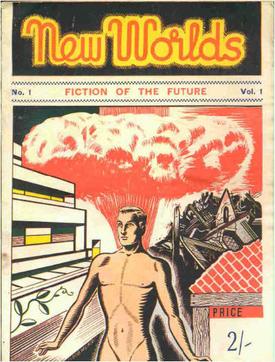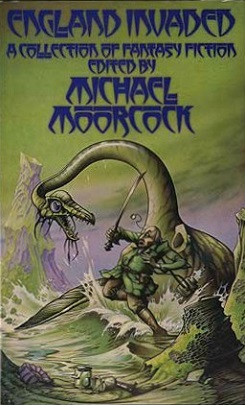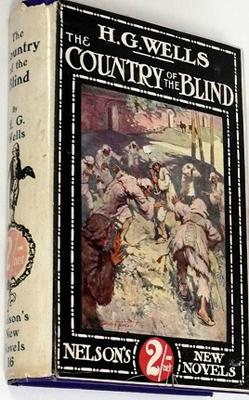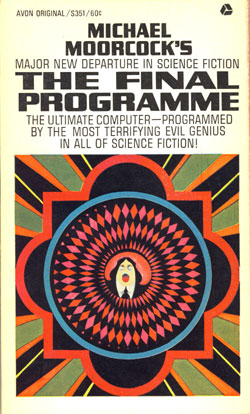
Michael John Moorcock is an English–American writer, particularly of science fiction and fantasy, who has published a number of well-received literary novels as well as comic thrillers, graphic novels and non-fiction. He has worked as an editor and is also a successful musician. He is best known for his novels about the character Elric of Melniboné, which were a seminal influence on the field of fantasy in the 1960s and 1970s.
The New Wave was a science fiction style of the 1960s and 1970s, characterized by a great degree of experimentation with the form and content of stories, greater imitation of the styles of non-science fiction literature, and an emphasis on the psychological and social sciences as opposed to the physical sciences. New Wave authors often considered themselves as part of the modernist tradition of fiction, and the New Wave was conceived as a deliberate change from the traditions of the science fiction characteristic of pulp magazines, which many of the writers involved considered irrelevant or unambitious.

Michael John Harrison, known for publication purposes primarily as M. John Harrison, is an English author and literary critic. His work includes the Viriconium sequence of novels and short stories (1971–1984), Climbers (1989), and the Kefahuchi Tract trilogy, which consists of Light (2002), Nova Swing (2006) and Empty Space (2012).
Monsieur Zenith the Albino is an ambiguous villain created by writer Anthony Skene for the "Sexton Blake" series of detective pulp fiction.

New Worlds was a British science fiction magazine that began in 1936 as a fanzine called Novae Terrae. John Carnell, who became Novae Terrae's editor in 1939, renamed it New Worlds that year. He was instrumental in turning it into a professional publication in 1946 and was the first editor of the new incarnation. It became the leading UK science fiction magazine; the period to 1960 has been described by science fiction historian Mike Ashley as the magazine's "Golden Age".

George Chetwynd Griffith-Jones was a British writer. He was active mainly in the science fiction genre—or as it was known at the time, scientific romance—in particular writing many future-war stories and playing a significant role in shaping that emerging subgenre. For a short period of time, he was the leading science fiction author in his home country both in terms of popularity and commercial success.

Invasion literature is a literary genre that was popular in the period between 1871 and the First World War (1914–1918). The invasion novel was first recognised as a literary genre in the UK, with the novella The Battle of Dorking: Reminiscences of a Volunteer (1871), an account of a German invasion of England, which, in the Western world, aroused the national imaginations and anxieties about hypothetical invasions by foreign powers; by 1914 the genre of invasion literature comprised more than 400 novels and stories.

The Battle of Dorking: Reminiscences of a Volunteer is an 1871 novella by George Tomkyns Chesney, starting the genre of invasion literature and an important precursor of science fiction. Written just after the Prussian victory in the Franco-Prussian War, it describes an invasion of Britain by a German-speaking country referred to in oblique terms as The Other Power or The Enemy.

England Invaded is an anthology of imaginative fiction, including invasion literature, from the Victorian and Edwardian periods, edited by British author Michael Moorcock. Originally published in hardback by W. H. Allen in 1977, it was re-issued as a paperback by Star in 1980.

"Frritt-Flacc" is a horror short story by Jules Verne. It was first published in December 1884 in the magazine Le Figaro illustré and then in 1886 together with the novel The Lottery Ticket as a part of the Voyages Extraordinaires series. The first English translation was published in 1892 in The Strand Magazine.

Mojo Press was a small press which primarily published science fiction, horror, and western books and graphic novels between 1994 and 1999.

The Country of the Blind and Other Stories is a collection of thirty-three fantasy and science fiction short stories written by the English author H. G. Wells between 1894 and 1909. It was first published by Thomas Nelson and Sons in 1911. All the stories had first been published in various weekly and monthly periodicals. Twenty-seven of the stories had also been previously published in five earlier story collections by Wells.

H. G. Wells was a prolific writer of both fiction and non-fiction. His writing career spanned more than sixty years, and his early science fiction novels earned him the title of "The Father of Science Fiction".

The Final Programme is a novel by British science fiction and fantasy writer Michael Moorcock. Written in 1965 as the underground culture was beginning to emerge, it was not published for several years. Moorcock has stated that publishers at the time considered it was "too freaky".

The Cornelius Quartet is the collective name for the Jerry Cornelius novels by Michael Moorcock, although the first one-volume edition was entitled The Cornelius Chronicles. It is composed of The Final Programme, A Cure for Cancer, The English Assassin and The Condition of Muzak. The collection has remained continuously in print for 30 years.

MonkeyBrain Books is an independent American publishing house based in Austin, Texas, specialising in books comprising both new content and reprinting online, international, or out-of-print content, which show "an academic interest," but which "reach a popular audience as well."
This is a bibliography of the works of Michael Moorcock.

Science Fiction: The 100 Best Novels, An English-Language Selection, 1949–1984 is a nonfiction book by David Pringle, published by Xanadu in 1985 with a foreword by Michael Moorcock. Primarily, the book comprises 100 short essays on the selected works, covered in order of publication, without any ranking. It is considered an important critical summary of the science fiction field.

The Robert E. Howard Reader is a collection of essays on fantasy writer Robert E. Howard and his works, edited by Darrell Schweitzer. Originally scheduled for publication in 2007, it was ultimately published in September 2010 by Wildside Press.
The multiverse is a series of parallel universes in many of the science fiction and fantasy novels and short stories written by Michael Moorcock. Central to these works is the concept of an Eternal Champion who has potentially multiple identities across multiple dimensions. The multiverse contains a legion of different versions of Earth in various times, histories, and occasionally, sizes. One example is the world in which his Elric Saga takes place. The multiplicity of places in this collection of universes include London, Melniboné, Tanelorn, the Young Kingdoms, and the Realm of Dreams.















